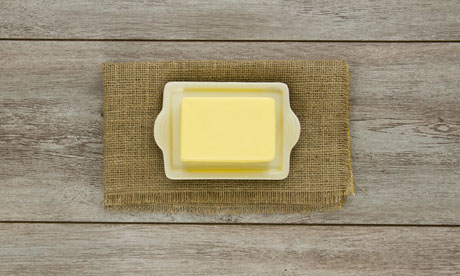Why butter is good for you
Don't believe the bad press – this creamy dairy staple is nutritious and has no equal in taste

Butter isn't as bad as we have been made to believe.... Photograph: Alamy
Despite its best efforts, the margarine lobby has failed to convince us that its synthetic concoctions taste anywhere near as good as butter. People eat spreads on sufferance, having been browbeaten into believing butter is bad for us. But forgoing this versatile, natural fat that graces every food it touches is a misguided penance.
Toast with a thick layer of butter is the ultimate comfort food. Without butter, there's no golden crust on your gratin dauphinois, no dreamy bearnaise sauce. Shortbread made with margarine? Gruesome. Avoid spreadable butter: it often has oil in it, which spoils the taste and consistency.
Why is butter good for me?
The nutritional gospel that saturated fat is unhealthy and fattening is melting away. A recent review published in the American Journal of Clinical Nutrition concluded: "There is no convincing evidence that saturated fat causes heart disease."
The nutritional gospel that saturated fat is unhealthy and fattening is melting away. A recent review published in the American Journal of Clinical Nutrition concluded: "There is no convincing evidence that saturated fat causes heart disease."
Butter is an excellent source of vitamin A, D and K, essential for the efficient absorption of calcium and phosphorus, and therefore strong bones and teeth. Vitamin K also helps protect against bone calcification. Butter is rich in short- and medium-chain fatty acids, such as conjugated linoleic acids; these have a significant anti-tumour, anti-cancer action. Butter from grass-fed cows has more CLA than those fed grain, so organic butter is a wise choice. Butter has anti-fungal properties too.
Where to buy and what to pay
If you're lucky, you'll find traditional farm butter, made from ripened cream, in farmers' markets. Otherwise, you'll pay anything from 95p to £2 for 250g.
If you're lucky, you'll find traditional farm butter, made from ripened cream, in farmers' markets. Otherwise, you'll pay anything from 95p to £2 for 250g.
Joanna Blythman is the author of What To Eat (Fourth Estate, £9.99). To order a copy for £7.99 with free UK p&p, go to guardianbookshop.co.uk
Cambridge butter
Since working at Fitzbillies I recently discovered a wonderful old-fashioned recipe called Cambridge sauce, which contains anchovy, capers, herbs, mustard and chopped boiled egg. I decided that by omitting the egg I could make a delicious butter to serve on top of grilled steak or with vegetables; it's delicious and very versatile. The butter will keep well in the fridge, or I freeze it in small quantities and bring it out as and when I need it.
Makes around 250g
2 tsp dry English mustard
A pinch of cayenne
250g unsalted butter, softened
10 anchovy fillets, roughly chopped
2 tbsp caper, washed if salted
5 sprigs of tarragon, leaves removed and finely chopped
A small bunch of chives, finely chopped
A handful of flat-leaf parsley, finely chopped
2 tsp dry English mustard
A pinch of cayenne
250g unsalted butter, softened
10 anchovy fillets, roughly chopped
2 tbsp caper, washed if salted
5 sprigs of tarragon, leaves removed and finely chopped
A small bunch of chives, finely chopped
A handful of flat-leaf parsley, finely chopped
1 Beat the dry mustard, cayenne and butter in a bowl until amalgamated, then fold in the rest of the ingredients.
2 Wrap the butter in greaseproof paper, then shape into a cylinder by rolling it up. Chill or freeze, depending on when you plan on using it.
3 Cut into slices and melt on the top of a cooked steak, or on to potatoes, spinach or sprouting broccoli, or just spread on to toast and dip into a soft‑boiled egg.
Rosie Sykes is head chef of Fitzbillies (fitzbillies.com) and co-author ofThe Kitchen Revolution (Ebury Press, £2 7.50). To order a copy for £20 with free UK p&p, go to guardianbookshop.co.uk
No comments:
Post a Comment